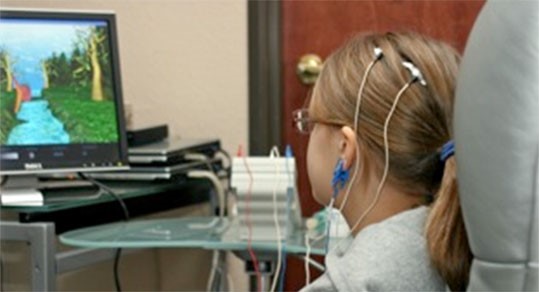The Process
1 – Test current brain function and performance with TOVA
Assess and diagnose attention and mental health disorders with proven accuracy of 87% of normal patients and 90% of ADHD patients. The TOVA is like a computer game that lasts only a few minutes which provides a baseline to accurately measure response to treatment.
2 – Test with QEEG current brainwave patterns
QEEG measures the minute electrical activity of a person’s brain by recording the brainwave patterns of up to 24 points on the brain for a period of five minutes. It is then sent for analysis where it compares that unique pattern to “normal” and “abnormal” patterns. A program for Neurotherapy is designed based on your unique brainwave patterns to normalise any areas that have been causing difficulty. Brainwave patterns are unique, no two people are alike, so QEEG testing prior to training with Neurotherapy is essential for optimal results designed right for you.
3 – Retrain & Maintain with Neurotherapy
How it works is through an enjoyable approach to improving behaviour and mental health conditions through a reward mechanism where a patient uses his brainwaves to play a movie as a reward – whatever movie you choose. The session lasts 40 minutes, with 30 sessions in a 3 month period shown in research to produce long lasting improvements in brainwave patterns.
What is Neurotherapy?
Once the nutrition and biochemistry of the brain is restored, Neurotherapy is a brainwave training therapy that may be required for long term results when the problem is not resolved through nutrition alone. It is a simple technique used with computer software that allows you to retrain the brain to produce healthy brainwave patterns. Whether the problem stems from ADD/ADHD, depression, anxiety, autism, a learning or behavioural problem, a stroke, head injury, deficits following neurosurgery, uncontrolled epilepsy, cognitive dysfunction associated with aging, obsessive-compulsive disorder, or other brain-related conditions, Neurotherapy training offers additional opportunities for rehabilitation through directly retraining the brain. How it works is through a fun approach to improving behaviour and mental health conditions through a reward mechanism where a patient uses his brainwaves to play a movie as a reward. The session lasts 40 minutes, with 30 sessions in a 3 month period shown in research to produce long lasting improvements in brainwave patterns.
Areas where Neurotherapy has been researched and has been found to be effective include:
- Substance abuse
- Anxiety
- Depression
- Epilepsy
- OCD
- Learning disabilities
- Bipolar Disorder
- Conduct Disorders
- Anger and rage management
- Cognitive impairment
- Migraines and headaches
- Chronic pain
- Autism spectrum disorders
- Sleep dysregulation
- PTSD
- Dementia
Even when a problem is biological in nature, Neurotherapy is another treatment alternative that is medication free. Neurotherapy is also being used increasingly to facilitate peak performance in “normal” individuals and athletes.
Combining the experience of our practitioners with the advanced testing facilities available at Advanced Wellness & Behavioural Centre such as QEEG, TOVA, and functional pathology, we are able to accurately determine almost immediately what is occurring in the brain to design a health program unique to you for the most effective and best treatment available for your mental health condition. This testing regime leaves nothing to the imagination reducing treatment time and financial investment for efficiency in resolving your health concerns.
Frank H. Duffy, M.D., a Professor and Pediatric Neurologist at Harvard Medical School, stated in an editorial in the January 2000 issue of the journal Clinical Electroencephalography that scholarly literature now suggests that:
“Neurotherapy should play a major therapeutic role in many difficult areas. In my opinion, if any medication had demonstrated such a wide spectrum of efficacy it would be universally accepted and widely used” (p. v). “It is a field to be taken seriously by all”
– extract from an article by Professor Corydon Hammond. Physical Medicine & Rehabilitation. University of Utah School of Medicine.
How does Neurotherapy work?
Two bars on the patients screen represent the brainwaves that are being trained. The patient uses his/her mind to control the height of the bars by practicing bringing the “out of balance” brainwave patterns into range with focus. The DVD plays when the two bars are within the target zone. The patient is then rewarded for being able to control his/her brainwave activity. In just two sessions it is quite easy to reach the target zone, the remaining sessions of practice are what makes these changes more permanent, bringing these difficult areas up to speed with the rest of the brain. This technology has been around in more simplified forms since 1967 and is well researched. Through this conditioning process, watching the DVD is dependant on successful suppression of theta activity or whatever other brainwave activity we wish to improve. Any DVD can be used, and this of course improves compliance with Neurotherapy training, making it an enjoyable experience.
Neurotherapy is also called Neurofeedback training or brainwave (EEG) biofeedback. During typical training, one or two sensors are placed on the scalp and one on each ear lobe. Then, high-tech electronic equipment provides real-time (instantaneous) audio and visual feedback about brainwave activity. The sensors measure the electrical patterns coming from the brain, much like a physician listens to someone’s heart from the surface of the chest. No electrical current is put into the brain. The brainwave patterns are relayed to the computer and recorded through QEEG.
Ordinarily, we cannot influence our brainwave patterns because we lack awareness of them. However, when you can see your brainwaves on a computer screen a few thousandths of a second after they occur, it gives you the ability to influence and change them. The mechanism of action is called operant conditioning. We are literally reconditioning and retraining the brain. At first, the changes are short-lived, but the changes gradually become more enduring with practice. With continuing feedback, coaching, and practice, we can usually retrain healthier brainwave patterns in most people. It is a little like exercising or doing physical therapy with the brain, enhancing cognitive flexibility and control, and the effects are expected to be permanent.
Obesity can be attributed to a disorder of energy balance. The set-point for obese individuals is set to a higher level. We aim to reset the patient’s metabolic set point, and restructure to prevent metabolic adaptation. Regular psychological breaks from active dieting are required to achieve a sustained weight loss. for you individually. We educate you to implement lifestyle and behaviour changes to facillitate effective and sustained weight loss. Reducing dietary glycaemic load will reduce insulin release and help patients lose fat, particularly visceral adipose tissue, thus helping to minimise the risk of many chronic illnesses along the way. We would be honoured if you started your health journey with us. Together on the natural journey to you at your peak.



